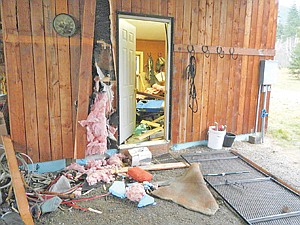FWP officials euthanize three habituated grizzly bears
Three grizzly bears, one of which in the Eureka area, were captured by Montana Fish Wildlife & Parks biologists and euthanized with the assistance of local veterinarians.
The bears had become food-conditioned and caused conflicts resulting in property damage and in one case, lots of dead chickens, said Grizzly Bear Management Specialist Tim Manley.
Wildlife Manager Jim Williams called the situation unfortunate.
“We typically learn from the bear’s behavior when it is time to remove them,” said Williams. “There is a threshold at which it is not safe to release a problem grizzly bear back into the wild. In all three of these cases the bears had progressed to breaking through structures near occupied residences and/or had a long previous history of conflict with humans. In each case, the problems started with human attractants.”
The first bear, a three-year old, 140-pound, female was captured and euthanized Oct. 28 near Nyack east of West Glacier after the bear had caused property damage by breaking into a chicken coop to get feed and attempting to get through a door on a porch to get dog food. Because of the property damage and history, the decision was made to remove the bear.
The second grizzly was removed in the Glen Lake area near Eureka on Oct. 30. This 375-pound, six-year old male was also food-conditioned and had been killing chickens and breaking into structures.
Because of the property damage and large number of chickens that were killed at several places, the decision was made to remove the bear.
The third grizzly bear removed was a seven-year old, 525-pound male that was captured on the east side of the Flathead Valley near Mud Lake on Nov. 2. This bear had caused extensive damage to a tack shed that was used to store horse grain.
The landowner had made a good effort to “bear proof” his shed after a bear tried getting into it 10 years ago. He had put up steel diamond mesh over a metal door and window. The bear put a hole through the wall and also pulled down the mesh over the door and pushed in the metal door.
Because of extensive property damage the decision was made to remove the bear.
Manley noted that overall, this season had been fairly quiet with regard to grizzly bear conflicts, until October. In addition to these three bears, trapping for grizzly bears causing conflicts has also occurred in the Farm-to-Market, Blankenship, Columbia Falls, and Pinkham Creek areas. Most grizzly bears den during the month of November, and a telemetry flight conducted on Oct. 19 showed three female grizzly bears at their dens.
“The best thing that residents living in bear country can do to prevent bear conflicts is to secure attractants such as garbage, pet food, and bird feeders so that bears don’t get food rewards and start looking around homes and buildings for food,” said Manley. “Chickens and other livestock can be protected with properly installed and maintained electric fencing.”
(This story was solely based on a press release from Montana Fish, Wildlife & Parks.)

